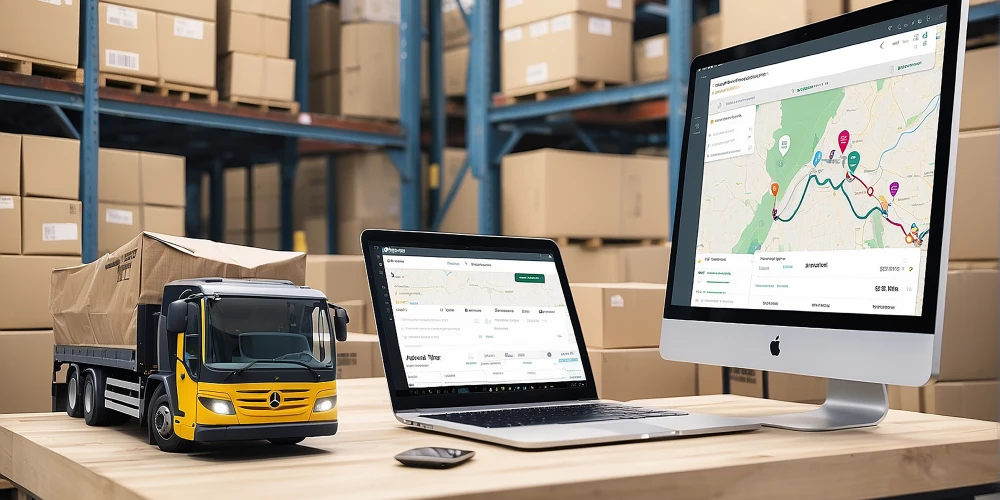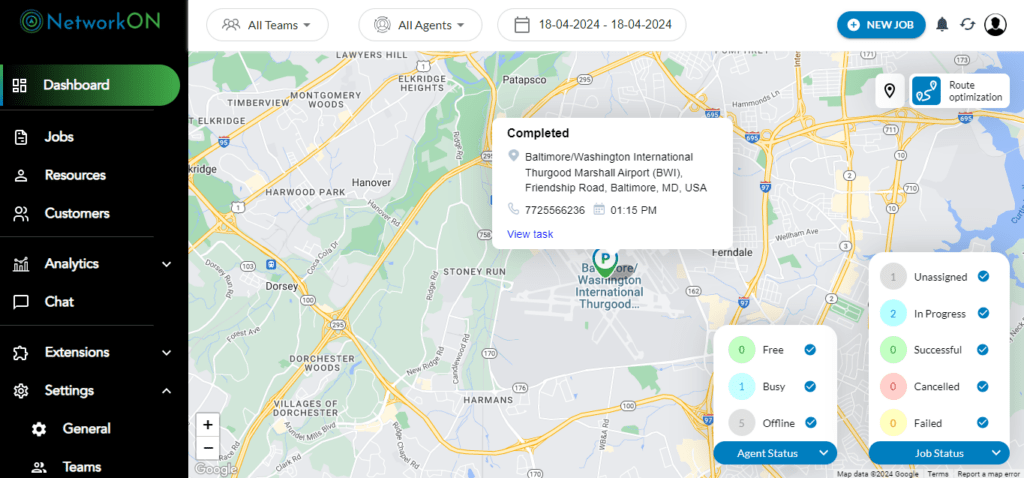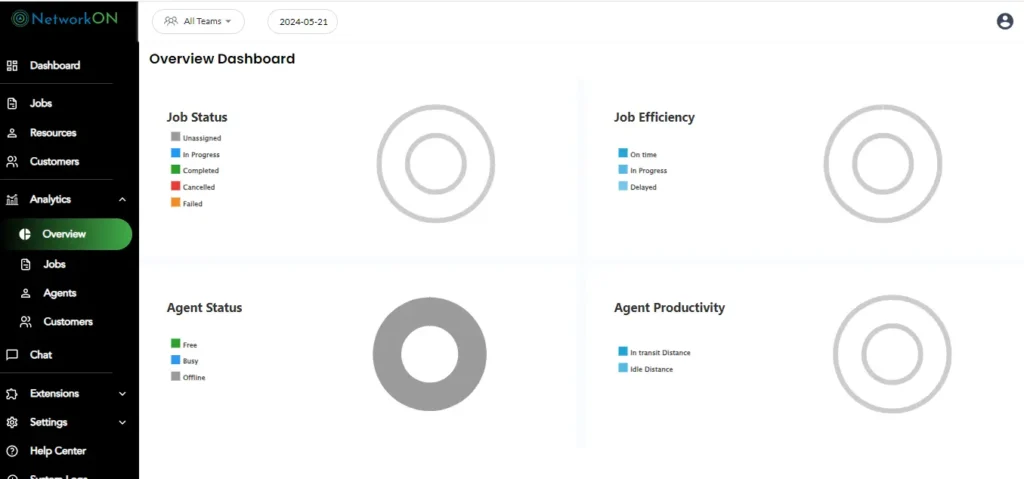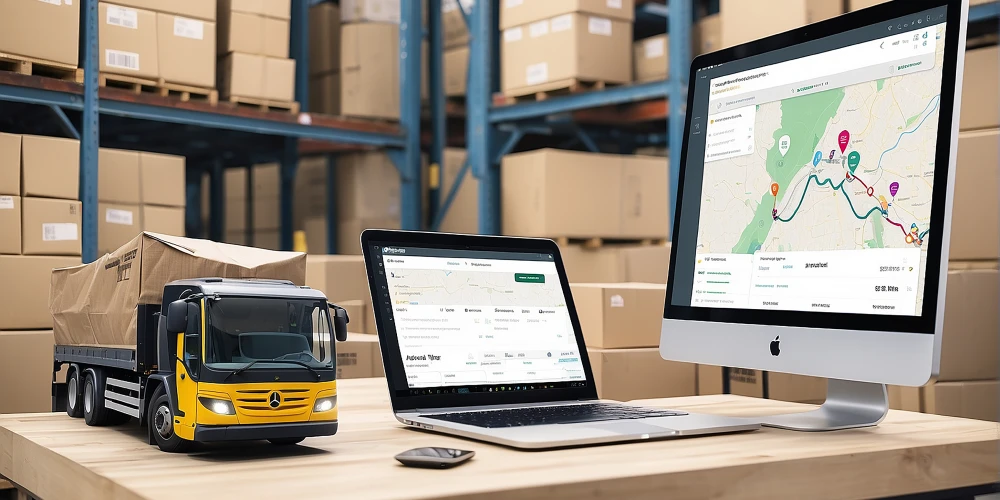Table of Contents
In a world where the timely delivery of goods plays a pivotal role in business success, Shipping Logistics Software emerges as the cornerstone of efficient and agile supply chains. This specialized software is the lifeline for modern Third-Party Logistics (3PL) providers, redefining the dynamics of shipment planning, execution, and tracking.
By streamlining operations and enabling real-time decision-making, shipping logistics software propels Third-Party Logistics services to new heights, ensuring that the growing demands of global trade are met with precision and reliability.

Furthermore, the benefits of integrating Shipping Logistics Software solutions are immeasurable, leading to improved cost-effectiveness, enhanced customer satisfaction, and seamless management of logistics complexities. Join us as we delve deeper into the transformative impact of shipping logistics software and its indispensable role in contemporary logistics management.
Comprehensive Management with WMS and TMS
Shipping logistics software is crucial in streamlining warehouse and transportation operations for third-party logistics (3PL). Integrating advanced technologies like Warehouse Management Systems (WMS) and Transportation Management Systems (TMS) can lead to unprecedented efficiency and accuracy in managing logistics demands.
Importance of Warehouse Management Systems (WMS) for Inventory Control
Effective inventory control is the cornerstone of any successful logistics operation. A robust WMS fortifies this by providing comprehensive tools to monitor stock levels, manage storage space, and streamline order fulfillment processes. It enhances accuracy, minimizes errors, and improves overall warehouse productivity, vital in a competitive Third-Party Logistics landscape.
Transportation Management Systems (TMS) for Optimized Shipment Operations
A TMS is indispensable in transportation. This technology optimizes shipment operations by simplifying rate comparison, carrier selection, and route planning. Real-time tracking of shipments coupled with detailed analytics helps make informed decisions, reduce costs, and improve delivery times. This optimization directly impacts customer satisfaction and retention.
The Interplay between WMS and TMS for Seamless Logistics Management
The true power of shipping logistics software lies in the seamless integration of WMS and TMS. This synergy enables comprehensive logistics operations management from the warehouse floor to the final delivery destination. It ensures a smooth flow of information and goods, reducing bottlenecks and offering a transparent, cohesive management system.
- Inventory Accuracy: WMS provides real-time inventory data that TMS utilizes to plan the most efficient shipping methods.
- Operational Efficiency: The combined data from WMS and TMS offer insights that drive workflow optimizations and reduce operational costs.
- Enhanced Customer Service: With accurate inventory and delivery information at their fingertips, businesses can offer improved customer service, fostering trust and loyalty.
The Nexus of Order Fulfillment and Real-time Tracking
The seamless integration of order fulfillment and real-time tracking is a cornerstone of modern shipping logistics software. Such an integration not only empowers supply chain agility but also ensures that clients are continuously informed and satisfied with the progression of their shipments. In this pivotal part of logistics management, technology plays a transformative role.
Streamlining Order Fulfillment and Processing with Logistics Software
In third-party logistics, efficiency and accuracy in order fulfillment are non-negotiable. Shipping logistics software streamlines these processes by automating tasks, from inventory management to picking, packing, and shipping. This automation reduces human error and accelerates the time from order placement to dispatch, resulting in a more efficient operation overall.
Implementing Real-time Tracking and Visibility for Client Satisfaction
In our digitally connected world, providing clients with real-time tracking capabilities is no longer a luxury but a standard expectation. High-caliber shipping logistics software delivers this by giving end-to-end visibility into shipment locations and statuses, enhancing client trust, and fostering stronger business relationships.
- Dynamic Tracking: Clients can monitor their shipments in real-time, which keeps them informed and allows them to plan for the arrival of goods.
- Proactive Updates: Logistics providers can proactively communicate critical information instead of responding to inquiries, avoiding potential frustration and dissatisfaction.
The Significance of Dynamic Shipment Updates in Service Excellence
Dynamic shipment updates are indispensable for service excellence. Real-time data provided by shipping logistics software empowers businesses to make informed decisions and provides customers with insight into the journey of their goods. This transparency is vital for maintaining high service standards and consistently meeting tech-savvy clients’ evolving expectations.
Enhance Your Third-Party Logistics Operations with Strategic Supply Chain Optimization.
Competing in today’s logistics industry demands a strategic approach to supply chain management. Third-party logistics providers who leverage cutting-edge shipping logistics software are setting new benchmarks for efficiency and performance. Here are critical strategies to revolutionize your supply chain optimization:
Employing Advanced Software for End-to-End Supply Chain Optimization
Advanced shipping logistics software serves as the backbone of modern supply chain strategies. Third-Party Logistics providers can ensure end-to-end visibility and control over their operations by integrating such software. This leads to improved inventory management, streamlined order processing, and enhanced customer satisfaction.
Carrier Integration and Freight Auditing for Cost Efficiency
Cost management is a pivotal factor in the logistics equation.Third-party logistics providers can save significantly through carrier integration and meticulous freight auditing. This optimization level helps identify the most cost-effective shipping methods while ensuring timely delivery.
Demand Forecasting and Planning with Sophisticated Data Analysis
When you have the right tools, anticipating customer needs is not a guessing game. The sophisticated data analysis capabilities of top-tier shipping logistics software allow for precise demand forecasting and resource planning, reducing waste and increasing the ability to scale operations responsively.
- Software-driven forecasts: Use historical data and AI algorithms to predict future demand accurately.
- Resource allocation: Optimize warehousing and staff deployment proactively, avoiding excesses or shortages.
- Inventory optimization: Using real-time data, maintain optimal inventory levels to meet demand without surplus.
Returns Management and Reverse Logistics
Returns management and the intricacies of reverse logistics are critical components in the modern landscape of shipping logistics. Optimizing these processes through sophisticated shipping logistics software enhances operational efficiency. It cultivates stronger customer relationships by ensuring a smooth return experience.
Facilitating Effective Returns Management with Tailored Software Solutions
Shipping logistics software with advanced returns management features can simplify the complex handling process. Tailor-made software solutions can streamline every step, from initiating return requests to restocking or recycling returned goods. These systems provide a framework for managing returns that minimizes loss and supports a sustainable supply chain.
The Role of Reverse Logistics in a Comprehensive Service Platform
Reverse logistics is not simply an afterthought but a key element of a comprehensive service platform for third-party logistics providers. A cutting-edge shipping logistics software that includes reverse logistics capabilities ensures that products move backward through the supply chain efficiently and cost-effectively, providing a full lifecycle view of product management.
- Improves inventory management for returned assets
- Reduces costs and waste associated with returns
- Increases the speed of product returns and processing
- Provides valuable data for analytics and quality control
Enhancing Customer Relationships through Efficient Returns Processes
An efficient returns process, bolstered by dedicated shipping logistics software, is crucial for maintaining positive customer relations. Companies must handle returns swiftly and effectively to maintain customer trust and satisfaction. Businesses reinforce their commitment to service quality and encourage customer loyalty.
Strategic return and reverse logistics management through specialized software has become indispensable for any thriving Third-party logistics provider. These capabilities are central to managing the lifecycle of goods and play a vital role in shaping a resilient, customer-focused supply chain.
Cross Docking, Transloading, and Compliance: Pillars of Efficient Shipping Logistics
In today’s fast-paced global market, three key operational strategies—cross docking, transloading, and compliance—are critical in streamlining shipping logistics. By leveraging the advanced features of shipping logistics software, third-party logistics (3PL) providers can ensure efficient cargo handling and adherence to regulatory standards, essential for maintaining a competitive advantage.
Leveraging Cross-Docking and Transloading Features in Logistics Software
Cross docking and transloading are logistical maneuvers that minimize storage time and expedite the transport of goods. Logistics software with these functionalities allows seamless cargo movement from incoming to outgoing transportation modes, bypassing prolonged storage. This process reduces handling costs and accelerates delivery times, proving indispensable for companies aiming to keep pace with the increasing demand for rapid shipping services.
Ensuring Compliance and Security in Global Shipping Operations
As goods traverse national borders, Third-Party Logistics providers must navigate a complex landscape of regulatory requirements and security measures. Robust shipping logistics software facilitates this process by automating compliance checks and documentation generation, offering defense against costly penalties and operational setbacks. More importantly, it helps companies uphold the integrity of their supply chain, ensuring that all procedures adhere to the highest security and compliance standards.
The Importance of Regulatory Compliance Management in a Third-Party Logistics Context
In third-party logistics, regulatory compliance management is not a choice but a necessity. The ramifications of non-compliance can range from financial penalties to severe disruptions in supply chain operations. An authoritative shipping logistics software empowers Third-Party Logistics providers with up-to-date information on international trade regulations, tax laws, and import/export restrictions, allowing them to maintain a transparent and compliant logistical workflow. This proactive approach to compliance reinforces a company’s reputation for reliability and trustworthiness among its clientele.
- Minimize legal risks and avoid fines through diligent adherence to shipping laws and regulations.
- Streamlined processing of customs documentation, reducing delays and enhancing the speed of international shipments.
- Comprehensive logs and audit trails, ensuring accountability and traceability throughout the supply chain.
Data-Driven Decision Making with Analytics and Reporting
The Power of Analytics and Reporting in shipping logistics cannot be overstated. With the complexity of today’s supply chains, leveraging data is essential for process improvement and maintaining a competitive edge. Advanced shipping logistics software has powerful analytics and reporting tools that transform raw data into actionable insights. These tools enable logistics providers to identify inefficiencies, forecast demands, and optimize their operations for better performance.
Customizable Dashboards and Reports that Drive Business Insights

Having data is one thing, but making sense of it is another. Customizable dashboards and reports are pivotal features of top-tier shipping logistics software. They allow businesses to tailor their reporting to focus on the key performance indicators (KPIs) that matter most to their operations. Tracking these metrics closely enables logistics providers to make informed decisions that directly impact their bottom line and operational success.
Utilizing Data for Predictive Analytics and Strategic Planning in Logistics

Shipping logistics software is not just about understanding the present; it’s also a tool for predicting the future. With predictive analytics, logistics companies can anticipate trends, manage risks, and devise robust strategic plans. This forward-thinking approach empowers Third-Party Logistics providers to stay ahead of the curve, adapting to market changes proactively rather than reactively. Consequently, this leads to improved service levels, customer satisfaction, and long-term sustainability in the rapidly evolving world of logistics.
The Importance of Scalability and Flexibility in Third-Party Logistics Growth
As third-party logistics providers expand their services in an ever-evolving market, the ability to scale and flex becomes beneficial and imperative for sustained growth. Positioning for future success means investing in shipping logistics software that is both scalable and flexible, ensuring that your Third-Party Logistics business can rise to meet the increasing complexity of supply chain demands.
How Logistics Software Can Adapt to Growing Business Demands
Optimized shipping logistics software is designed to grow in tandem with your business. As order volumes increase and new clients come on board, the system should effortlessly support that growth without requiring extensive reconfiguration or downtime. Scalable software allows additional resources, functionality, and users to be added seamlessly, guaranteeing that operational efficiency stays consistent even as business booms.
The Critical Nature of Flexible Integration with Various Carriers and Partners
Strong connections with carriers and partners are vital to Third-Party Logistics success. Flexible shipping logistics software is the backbone of such integrations, allowing for real-time data exchange and streamlined communication. As industry standards and partner systems evolve, a flexible software solution can adapt quickly, integrating new processes and protocols without interrupting service, thus sustaining growth and driving value across the supply chain.
Ensuring Future-proof Logistics Services with Scalable Software Solutions
The hallmark of robust shipping logistics software is its ability to meet current needs and anticipate and adapt to future challenges. Scalable solutions allow Third-Party Logistics providers to offer innovative services and stay ahead of the competition. By investing in software that accommodates rapid changes in the market, logistics providers ensure that their services remain relevant and competitive, paving the way for progressive growth and long-term success.
In conclusion, a Third-Party Logistics provider’s choice in shipping logistics software must include scalability and flexibility to securely position their operations for expanding market opportunities and future developments. This strategic focus on adaptable technology ensures that Third-Party Logistics providers can deliver consistently efficient, cutting-edge services that foster growth and enhance their competitive edge.
CRM Integration: The Heart of Customer-Centric Logistics
Customer Relationship Management (CRM) systems have become indispensable in the modern landscape of shipping logistics software. When logistics platforms seamlessly integrate with CRM tools, they empower businesses to provide personalized, customer-focused service offerings. This integration lies at the core of customer-centric logistics, facilitating a symbiotic relationship where efficiency meets satisfaction.
Integrating Customer Relationship Management (CRM) Tools with Logistics Platforms
For a logistics operation to thrive in today’s competitive market, it’s not enough to move products efficiently; one must also excel in managing customer relationships. Integrating CRM tools with logistics software ensures a comprehensive view of customer interactions, enabling businesses to enhance service quality and responsiveness. By leveraging the data-driven prowess of integrated systems, companies can anticipate needs, address queries proactively, and streamline the end-to-end logistical process with the customer in mind.
Personalized Service Offerings Through Advanced CRM Capabilities
As customer expectations rise, personalized service offerings become the benchmark for excellence in the logistics sector. Advanced CRM capabilities within shipping logistics software allow for tailoring services to each client’s unique needs. Whether providing bespoke delivery options, customized billing, or specialized handling instructions, a strong CRM integration ensures businesses can adapt their logistics operations to better serve their clients.
Strengthening Client Relationships with Integrated Communications
Earnest and effective communication is the cornerstone of any strong relationship. By integrating CRM into logistics software, companies can manage all client communications within a unified platform. This integration facilitates seamless interactions across various channels, ensuring clients receive timely updates, support, and engagement. The result? A fortified bond with customers built on the solid foundation of consistent, transparent, and responsive communication.
Key Takeaways:
- Shipping logistics software is the cornerstone for efficient and agile supply chains. It enables third-party logistics providers to streamline operations, make real-time decisions, and meet the growing demands of global trade with precision and reliability.
- The seamless integration of Warehouse Management Systems (WMS) and Transportation Management Systems (TMS) leads to unprecedented efficiency and accuracy in managing logistics demands. This synergy ensures comprehensive logistics operations management, from the warehouse floor to the final delivery destination.
- Providing clients with real-time tracking capabilities is no longer optional—it’s an expectation. High-caliber shipping logistics software offers end-to-end visibility into shipment locations and statuses, fostering stronger business relationships and enhancing customer trust.
- Third-party logistics providers must employ advanced software for end-to-end supply chain optimization. From carrier integration to demand forecasting and returns management, leveraging sophisticated data analysis and automation drives efficiency and cost-effectiveness.
- To thrive in an ever-evolving market, third-party logistics providers must invest in scalable shipping logistics software that seamlessly integrates with CRM tools. This ensures personalized service offerings, strengthens client relationships, and positions operations for sustained growth and competitiveness.
Conclusion
The landscape of third-party logistics is undergoing a transformative shift driven by advanced shipping logistics software. As we conclude our in-depth exploration, it’s imperative to recognize the pivotal role that sophisticated digital tools play in shaping the future of logistics and supply chain management.
Throughout our discussion, we have highlighted the advantages of modern logistics software to Third-Party Logistics providers. These include enhanced inventory management, more efficient order fulfillment, granular tracking capabilities, improved customer relationships, and streamlined returns processes.
The collective impact of these benefits translates into reduced operational costs, increased accuracy, and elevated service levels that can sustain business growth and competitive advantage in a rapidly evolving market.
Looking ahead, the trajectory of technological advancements in shipping logistics suggests a landscape ripe with innovation. Robotics, artificial intelligence, the Internet of Things (IoT), and blockchain are emergent technologies that revolutionize how Third-Party Logistics providers operate and interact with their partners and customers. Integrating disruptive technologies will propel logistics providers’ efficiency and capabilities and redefine what clients expect from their shipping and supply chain solutions.
The evolution of Third-Party Logistics is inexorably tied to the sophistication of the shipping logistics software that supports it. By adopting advanced systems designed for resilience, scalability, and innovation, third-party logistics providers can confidently position themselves for success in an ever-changing global marketplace.
Transform your third-party logistics by embracing the cutting-edge capabilities of shipping logistics software with NetworkON. Invest in a software solution that puts you ahead of the curve. Our shipping logistics platform offers real-time tracking, advanced analytics, and seamless CRM integration—all within a user-friendly interface.
For more information contact us today!
Frequently Asked Questions
What are the key benefits of integrating shipping logistics software into third-party logistics operations?
Shipping logistics software offers many benefits, including enhanced inventory management, streamlined order fulfillment processes, real-time tracking capabilities, and improved customer relationships. These advantages translate into reduced operational costs, increased accuracy, and elevated service levels, ultimately fostering business growth and competitiveness in the logistics industry.
How does integrating Warehouse Management Systems (WMS) and Transportation Management Systems (TMS) improve logistics operations?
Integrating WMS and TMS leads to unprecedented efficiency and accuracy in managing logistics demands. This synergy enables comprehensive logistics operations management, from optimizing warehouse processes to planning and executing shipments. By leveraging these advanced technologies, third-party logistics providers can ensure seamless coordination and enhance overall operational effectiveness.
Why is real-time tracking capability essential in shipping logistics software?
Real-time tracking capability is no longer optional—it’s an expectation in today’s logistics landscape. High-caliber shipping logistics software provides end-to-end visibility into shipment locations and statuses, empowering businesses to offer proactive updates to clients. This transparency fosters stronger business relationships, enhances customer trust, and ultimately contributes to higher satisfaction.
What should third-party logistics providers consider when investing in shipping logistics software?
Third-party logistics providers should prioritize scalability, flexibility, and integration capabilities when investing in shipping logistics software. Scalable software ensures that operations can grow seamlessly with increasing demand. At the same time, flexible integration facilitates communication with various carriers and partners. Additionally, seamless integration with CRM tools enables personalized service offerings. It strengthens client relationships, positioning providers for sustained growth and competitiveness.





0 Conversations